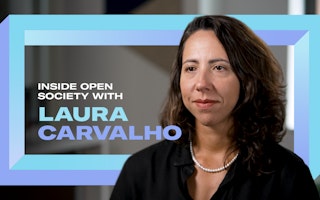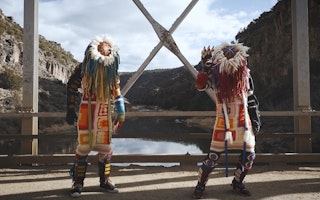Climate Justice: The Ultimate Challenge of Our Age
By Yamide Dagnet

Inside Open Society is a look at the leaders at the Open Society Foundations who are advancing our vision to address the world’s most urgent threats to democracy and human rights at a transformative scale.
I have been on the front lines of the climate crisis for decades. As a youngster from the Caribbean island of Guadeloupe, the impacts have struck close to home. Magical little places like Ilet Caret, an island where I have savored so many moments with family and friends since childhood, will disappear in a few years. Our critical coral barrier will be lost. The biodiversity inside a protected UNESCO biosphere site will be undermined. Waves already steal perfectly white sand. Homes, livelihoods, and recreational sites are all at risk. The losses are staggering. Even after years as a lead negotiator for the UK and the European Union, and involvement in the broader multilateral effort to address these issues, I am still frightened by the scale and costs of this crisis.
But for me, and the teams I’ve had the privilege to work with, this is not a reason to withdraw. Now is not the time to give up. The best available science tells us radical changes are needed to keep global temperature rise below 1.5 degrees Celsius, and we must decisively seize this rapidly narrowing window of opportunity without sacrificing the interests of the most vulnerable. This is the ultimate challenge of our age: the pursuit of climate justice! It is unquestionably a justice issue because climate risks and impacts disproportionately affect every aspect of the lives of those least responsible for the crisis—health, debt, infrastructure, cultural heritage, livelihood, security, and more. When combined with prevailing social, economic, and environmental vulnerabilities, the climate crisis both undermines and limits the wealth, growth, development, dignity, and very existence of vulnerable countries.
So, climate justice drives our thinking as the Open Society Foundations work to support the just transitions needed to enable a low-carbon global economy and resilient societies, especially in the Global South. Our mission is to expand the concept of “just transition” to bring a more people-centered, holistic, socioeconomic approach, as recommended by the latest reports from the Intergovernmental Panel on Climate Change. This approach stands in contrast with the more technical—and technocratic—efforts that have dominated climate policy and action for over three decades.
For us, climate justice isn’t just about subsistence and coping; it’s about ensuring that communities can thrive in a world transformed by climate impacts. To achieve this, we seek to maximize opportunities to promote more equitable, sustainable, and accessible finance, especially through reforms of global financial institutions; implementing rights-based and sustainable practices; and amplifying the voices and solutions of the most vulnerable people domestically and internationally. We also work to promote research, democratic engagement, and accountability mechanisms—and collaborate to minimize unintended adverse outcomes from climate measures.
Our mission is ambitious and centered on people. This is our unique opportunity to empower the most vulnerable with the tools they demand and need, and to shape the course of their destiny with more dignity.

Until February 2024, Yamide Dagnet was the director of Climate Justice at the Open Society Foundations.


